The thrill of progressing to the UEFA Champions League semifinals brings jubilation to Internazionale, but lurking beneath that elation is a sobering truth. Despite securing a tense 2-2 draw against Bayern Munich at the San Siro, the reality of needing to hold on for dear life exposes a fissure in what should be a more secure performance. The aggregate victory of 4-3 serves as a triumph, yet it also begs the question: how much longer can Inter rely on sheer grit to navigate such precarious moments? This brings us to a crucial juncture for manager Simone Inzaghi, who must meticulously analyze his team’s late-game tactics to avoid repeating these patterns of retreat.
While the extended narrative of their success paints a picture of resilience, Inter’s performance against Bayern reveals an unsettling trend of defensiveness that is contrary to their potential. Leading with a two-goal cushion, the expectation was not merely to maintain the status quo but to embrace the opportunity to extend their lead. Instead, the latter stages of the match devolved into a frantic defense against a siege of attacking play from the Bavarian giants. By allowing Bayern to dominate possession and create a barrage of chances—cumulatively outshooting Inter 8-2 in those closing minutes—Inter’s tactical acumen and competitive spirit appeared to falter.
Lessons from the Brink: The Case for Courage
Inzaghi’s leadership and methodology have established Inter as one of Europe’s formidable sides, yet these moments reveal an underlying hesitation that can prove fatal against higher-caliber opponents. The onset of anxiety amongst players is palpable. After Benjamin Pavard’s goal, the misalignment between ambition and execution became glaringly evident, revealing that Inter was no longer the imposing foe they were capable of being. Instead of dictating the game and exploiting the gaps left by a Bayern team missing key players like Jamal Musiala and Alphonso Davies, the Nerazzurri shrank under pressure.
What’s noteworthy is their overall tactical setup, which historically emphasizes proactive engagement rather than futile defense. The circumstances surrounding their performance against Bayern hint at the contagious nature of fear in football; once the mindset shifts from that of a confident competitor to a frenetic defender, it is often challenging to return. Inter opted to relinquish control during pivotal moments, allowing the pace of play to favor Bayern and ultimately inviting dangerous opportunities, such as Eric Dier’s game-tying goal.
Combatting Complacency: The Need for Assertiveness
When evaluating how Inter maneuvered through the match, one cannot overlook the fragility stemming from an over-cautious approach. The emphasis should be placed on trusting their inherent abilities to maintain an assertive style. With players such as Mehdi Taremi, brought on to stabilize the squad, the challenge remained: lacking match fitness often transforms potential reinforcements into liabilities. Inter’s current roster is seasoned, and while they have demonstrated remarkable defensive organization, it is clear that they must strike a balance between maintaining their defensive rigor and pursuing offensive opportunities swiftly when the chance arises.
Resilience must not translate into retreat. In fact, one could argue that while Inter’s historical reputation positions them as a veteran contender, their minute-to-minute decision-making displays a critical need for evolution. This is not merely a challenge of fitness or age; it’s about fostering a mindset that embraces risk while maintaining strategy. The juxtaposition of a great legacy against the backdrop of strategic paralysis calls for revolutionary thinking on the pitch—especially with their upcoming semifinal matchup against Barcelona.
Formidable Foes Await: The Barcelona Challenge
Looking ahead, Inter faces a major test as they go toe-to-toe with Barcelona, a team known for its fluid attacking play and tactical brilliance. Should they advance with a sense of apprehension borne from their recent experiences, the consequence could be catastrophic. A far better strategy would involve initiating aggressive counterattacks that exploit Barcelona’s high defensive line while applying pressure rather than cloistering around their penalty box. The memory of Bayern’s late resurgence after Inter tightened their grip could serve as a cautionary tale—a narrative not to repeat against an equally, if not more, dangerous side.
It’s imperative that Inter recognizes their strengths, specifically their capability to dictate the tempo and take command of matches. Against Barcelona, maintaining possession and transitioning swiftly would not just raise their confidence but potentially expose gaps in the opposition’s defensive organization.
Ultimately, this journey through the Champions League can be seen as a refining moment for Inter. While they possess the accolades of resilience and undeniable potential, it is time for an upsurge in assertiveness that aligns with their ambition, ensuring that they not only compete with the elite but also enhance their recognition as a true footballing powerhouse.

